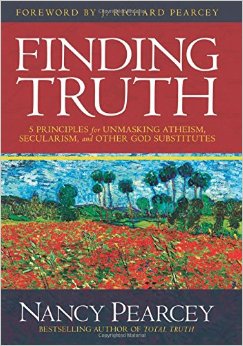 Culture & Ethics
Culture & Ethics
 Evolution
Evolution
 Faith & Science
Faith & Science
Darwin’s Robots: When Evolutionary Materialists Admit that Their Own Worldview Fails
Editor’s note: ENV is pleased to share this excerpt from Nancy Pearcey’s new book, Finding Truth: Five Principles for Unmasking Atheism, Secularism, and Other God Substitutes. A Fellow of Discovery Institute’s Center for Science & Culture, Pearcey is a professor and scholar-in-residence at Houston Baptist University and editor-at-large of The Pearcey Report. She is author of the 2005 ECPA Gold Medallion Award winner Total Truth: Liberating Christianity from Its Cultural Captivity and other books.
 A materialist philosophy reduces humans to machines — complex robots determined by material forces. It denies the reality of free will, the power to make decisions. Yet all civilizations throughout history have recognized that humans are moral agents capable of making responsible choices. There is no society without some moral code. The testimony of universal human experience is that humans are personal beings capable of willing and choosing — which means their origin must be a personal Being, not the blind forces of nature.
A materialist philosophy reduces humans to machines — complex robots determined by material forces. It denies the reality of free will, the power to make decisions. Yet all civilizations throughout history have recognized that humans are moral agents capable of making responsible choices. There is no society without some moral code. The testimony of universal human experience is that humans are personal beings capable of willing and choosing — which means their origin must be a personal Being, not the blind forces of nature.
Even materialists often admit that, in practice, it is impossible for humans to live any other way. One philosopher jokes that if people deny free will, then when ordering at a restaurant they should say, “Just bring me whatever the laws of nature have determined I will get.”
An especially clear example is Galen Strawson, a philosopher who states with great bravado, “The impossibility of free will … can be proved with complete certainty.” Yet in an interview, Strawson admits that, in practice, no one accepts his deterministic view. “To be honest, I can’t really accept it myself,” he says. “I can’t really live with this fact from day to day. Can you, really?”
But if humans “can’t really live with” the implications of a worldview, is it a reliable map to reality? Watch for phrases like this. Often they are clues that someone is trying to live out a worldview that does not fit the real world — that he or she has bumped up against one of the intractable facts that point to the biblical God.
Darwinian Psychopaths
In What Science Offers the Humanities, Edward Slingerland, identifies himself as an unabashed materialist and reductionist. Slingerland argues that Darwinian materialism leads logically to the conclusion that humans are robots — that our sense of having a will or self or consciousness is an illusion. Yet, he admits, it is an illusion we find impossible to shake. No one “can help acting like and at some level really feeling that he or she is free.” We are “constitutionally incapable of experiencing ourselves and other conspecifics [humans] as robots.”
One section in his book is even titled “We Are Robots Designed Not to Believe That We Are Robots.”
 How does Slingerland propose to resolve the contradiction between his “lived reality” and his deterministic philosophy? He does not even try. Instead he says “we need to pull off the trick of living with a dual consciousness, cultivating the ability to view human beings simultaneously under two descriptions: as physical systems and as persons.” In other words, he explicitly recommends constructing a mental dichotomy. Philosophers sometimes picture the division using the image of two stories in a building: In the lower story, humans are “physical systems,” in the upper story they are “persons.”
How does Slingerland propose to resolve the contradiction between his “lived reality” and his deterministic philosophy? He does not even try. Instead he says “we need to pull off the trick of living with a dual consciousness, cultivating the ability to view human beings simultaneously under two descriptions: as physical systems and as persons.” In other words, he explicitly recommends constructing a mental dichotomy. Philosophers sometimes picture the division using the image of two stories in a building: In the lower story, humans are “physical systems,” in the upper story they are “persons.”
Such compartmentalized thinking is what George Orwell famously called “doublethink,” and it functions here as a philosophical coping mechanism. When a worldview fails to account for all of reality, what do adherents do? Do they say, “I guess my theory has been falsified; I’d better toss it out”? Most people do not give up that easily. Instead they suppress the things that their worldview cannot explain, walling them off into a conceptual area separate from reality — an upper story of useful fictions. Wish fulfillment. Illusions.
A dual consciousness is a signal that contrary evidence from general revelation is being suppressed.
Slingerland acknowledges that his reductionist view of humans as essentially robots is contrary to ordinary experience. Gesturing toward his own daughter, Slingerland writes, “At an important and ineradicable level, the idea of my daughter as merely a complex robot carrying my genes into the next generation is both bizarre and repugnant to me.” Such a reductionistic view “inspires in us a kind of emotional resistance and even revulsion.”
Indeed, he writes, if you do not feel that revulsion, something is wrong with you:
There may well be individuals who lack this sense, and who can quite easily and thoroughly conceive of themselves and other people in purely instrumental, mechanistic terms, but we label such people “psychopaths,” and quite rightly try to identify them and put them away somewhere to protect the rest of us.
What can we say when someone urges us to adopt a view of humanity that he himself admits is bizarre and repugnant? That ought to inspire revulsion? That would justify us in labeling people “psychopaths” and locking them up? There is a severe clash between what his Darwinian materialism is telling him and what his lived experience is telling him. Which one will he accept as true?
Double-Minded Secularists
Marvin Minsky of MIT is best known for his pithy phrase that the human brain is nothing but “a three-pound computer made of meat.” Obviously, computers do not have the power of choice; the implication is that neither do humans. Surprisingly, however, Minsky then asks, “Does that mean we must embrace the modern scientific view and put aside the ancient myth of voluntary choice? No. We can’t do that.”
Why not? Minsky goes on: “No matter that the physical world provides no room for freedom of will; that concept is essential to our models of the mental realm.” We cannot “ever give it up. We’re virtually forced to maintain that belief, even though we know it’s false.” False, that is, according to Minsky’s materialist worldview.
This is an amazing case of Orwellian doublethink. Minsky says people are “forced to maintain” the conviction of free will, even when their own worldview tells them that “it’s false.”
When I teach these concepts in the classroom, an example my students find especially poignant is Flesh and Machines by Rodney Brooks, professor emeritus at MIT. Brooks writes that a human being is nothing but a machine — a “big bag of skin full of biomolecules” interacting by the laws of physics and chemistry. In ordinary life, of course, it is difficult to actually see people that way. But, he says, “When I look at my children, I can, when I force myself, … see that they are machines.”
Is that how he treats them, though? Of course not: “That is not how I treat them…. I interact with them on an entirely different level. They have my unconditional love, the furthest one might be able to get from rational analysis.” Certainly if what counts as “rational” is a materialist worldview in which humans are machines, then loving your children is irrational. It has no basis
within Brooks’s worldview. It sticks out of his box.
How does he reconcile such a heart-wrenching cognitive dissonance? He doesn’t. Brooks ends by saying, “I maintain two sets of inconsistent beliefs.” He has given up on any attempt to reconcile his theory with his experience. He has abandoned all hope for a unified, logically consistent worldview.
Losing Total Truth
This is the tragedy of the postmodern age. The things that matter most in life, that are necessary for a humane society — ideals like moral freedom, human dignity, even loving our own children — have been reduced to nothing but useful fictions. They are tossed into the upper story, which becomes a convenient dumping ground for anything that a materialist paradigm cannot explain.
Tragically, over time those humane ideals will inevitably lose their hold. After all, we are made in God’s image as logical beings; thus we tend to follow the logical consequences of our premises. It is psychologically impossible to accept concepts that we regard as fictions, no matter how useful. If someone like Brooks genuinely thinks his children are just mechanisms operating by whirring gears, that conviction will eventually erode the “unconditional love” he feels for them. If the leadership classes in a society genuinely think people are machines, that conviction will eventually erode political liberty.
Idols have practical consequences.
Of course, theologians debate the exact nature of human freedom. The Reformers, Luther and Calvin, emphasized that humans can do nothing to contribute to salvation. The liberating message of the Gospel is that we do not have to earn or work for salvation; that both justification and sanctification are by “hearing with faith” (Gal. 3:2, 5). But the Reformers did not mean that we
cannot choose whether to have ham or turkey on our sandwich for lunch.
By contrast, materialism holds that humans only think they are choosing ham or turkey. In reality their behavior is driven by natural forces such as neurons firing in the brain — just like sodium reacting with chlorine. Biblical worldviews, Christian or Jewish, agree in rejecting this materialist conception of humans as mere robots or meat machines.
The Bible teaches that humans are fallen sinners, but the fall did not make us less than human. It did not make us machines. Our actions are not simply links in a closed chain of causally connected physical events. We have the capacity to be first causes, starting a new chain of cause and effect.
Image by John Goodridge (Flickr: Down with Miserablism!) [CC BY-SA 2.0], via Wikimedia Commons.
� 2015 Nancy Pearcey. Finding Truth: 5 Principles for Unmasking Atheism Secularism, and Other God Substitutes published by David C Cook. All rights reserved.

